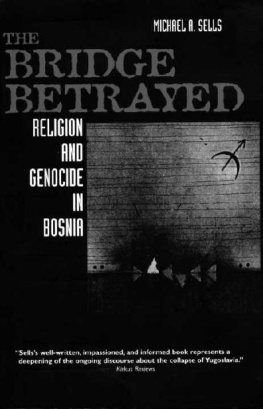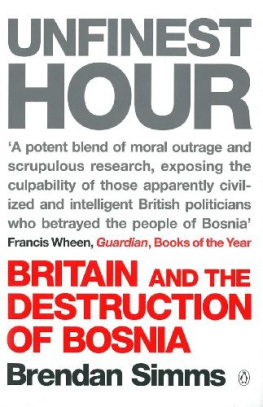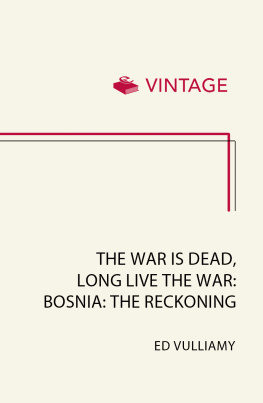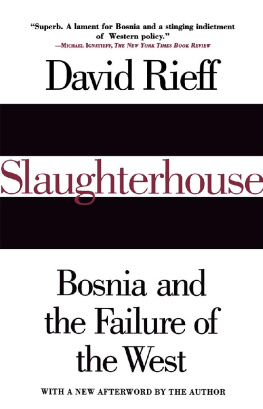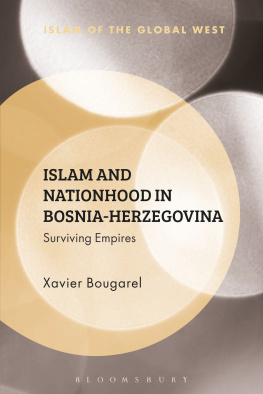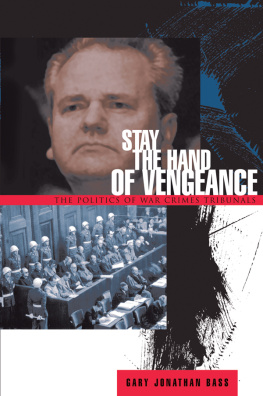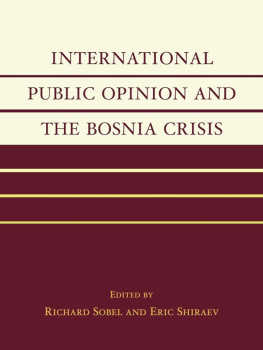Thank you for buying this ebook, published by NYU Press.
Sign up for our e-newsletters to receive information about forthcoming books, special discounts, and more!
Sign Up!
About NYU Press
A publisher of original scholarship since its founding in 1916, New York University Press Produces more than 100 new books each year, with a backlist of 3,000 titles in print. Working across the humanities and social sciences, NYU Press has award-winning lists in sociology, law, cultural and American studies, religion, American history, anthropology, politics, criminology, media and communication, literary studies, and psychology.
This Time We Knew
NEW YORK UNIVERSITY PRESS
New York and London
Copyright 1996 by New York University
All rights reserved
Library of Congress Cataloging-in-Publication Data
This time we knew : western responses to genocide in Bosnia / edited
by Thomas Cushman and Stjepan G. Metrovi.
p. cm.
Includes bibliographical references and index.
ISBN 0814715346 (alk. paper)
1. Yugoslav War, 1991 2. GenocideBosnia and Hercegovina.
3. World politics1989 I. Metrovi, Stjepan Gabriel.
II. Cushman, Thomas, 1959
DR1313.T485 1996
949.7024dc2096-10071 96-10071
CIP
New York University Press books are printed on acid-free paper, and
their binding materials are chosen for strength and durability.
Manufactured in the United States of America
10 9 8 7 6 5 4 3 2 1
To our daughters, who we hope will not see
genocide again in their lifetimes.
Contents
Thomas Cushman and Stjepan G. Metrovi |
Philip J. Cohen |
Brendan Simms |
Jean Baudrillard |
Daniel Kofman |
Michael N. Barnett |
Slaven Letica |
Brad K. Blitz |
Daniele Conversi |
James J. Sadkovich |
Liah Greenfeld |
Sheri Fink |
David Riesman |
Acknowledgments
The two coeditors of this volume were blessed with a nearly perfect working relationship. As social theorists and intellectuals, we share a number of theoretical interests, including postmodernism, critical theory, and an eclectic approach to theory. As friends, we shared our disbelief and outrage at the rationalizations, excuses, and obfuscations about the genocide that is still occurring in the Balkans. This blend of theoretical interests and reaction to current events led to our collaboration on this volume. It is our hope that the volume will provide an impetus for further exploration of Western indifference to genocide, not only in Bosnia, but in other parts of the world.
Each of us comes from otherwise different backgrounds, and acknowledges the assistance, inspiration, and encouragement of different individuals, but also of individuals common to both. Both editors thank the authors for working under pressure to meet deadlines. We are both grateful to the editors at New York University Press for their enthusiastic support of this project. Metrovi is especially grateful to David Riesman for his ongoing correspondence concerning the current Balkan War and for his encouragement in putting together this project. Cushman would like to thank Daniel Kofman, Michael Barnett, Sheri Fink, and Carol Hartigan for comments and advice on various stages of this project. Special thanks are due to James Petterson of the Wellesley College Department of French for providing superb translations of Jean Baudrillards essays. The Wellesley College Committee on Faculty Awards provided generous financial assistance for all stages of this project. Finally, we are thankful to our wives and daughters for letting us spend too much time away from them working on this project.
ONE
Introduction
Thomas Cushman and
Stjepan G. Metrovi
In the summer of 1995, Bosnian Serb attacks on UN-declared safe areas of Srebrenica and epa proceeded, as did previous onslaughts in Bosnia, under the watchful gaze of the West. In the ensuing violence, thousands of Muslims were driven from their homes or executed and buried in mass graves. In late November 1995, UN Secretary-General Boutros Boutros-Ghali reported that as many as 5,500 people are still unaccounted for in the wake of the Serbian attacks. At the time, no Western power intervened to stop the massacres. In the aftermath of the slaughter, however, the unexpected happened: Western powers seemingly decided that they had had enough of Serbian atrocities, war crimes, and genocide in Bosnia and made an apparent commitment to mobilize military power to protect other safe areas and to bring the Bosnian Serb leaders to the peace table. NATO air strikes commenced against the Bosnian Serbs, ostensibly to force them to remove their heavy weapons from the perimeter of Sarajevo.
This Western action was not agreeable to all the members of the NATO alliance. Yet it did occur, and the very fact that it did was remarkable, for the response of the West to the crisis in the Balkans prior to the air strikes had been weak, indecisive, and ineffective. One could even make the case that the nature of the Western response actually abetted genocide and other crimes against humanity in the region by allowing the perpetrators to proceed with a guarantee that they would not be punished. Bosnian Serb forces pulled their weapons back, but fighting continued and ethnic cleansing and war crimes continued even as peace talks proceeded. In the northern territory near the city of Banja Luka, under threat of a concerted Croat-Muslim drive in 1995 to reconquer territory that was seized and ethnically cleansed three years ago, Bosnian Serb leaders reactivated concentration camps and their policies of mass terror and summary execution of civilians. Nonetheless, the West, weary of the conflict and perhaps guilty about its own silence in relation to it, continued to press for peace at any cost. Peace talks were held in Dayton, Ohio, anddespite Radovan Karadis pronouncement that, as a result of the peace talks, Sarajevo will bleed for decadesthe parties in the conflict concluded a peace agreement in December, 1995. Questions of a just peace were put to the side in favor of settling the conflict, even at the cost of legitimizing ill-gotten Serbian territorial gains in Bosnia and at the cost of tolerating the nefarious deeds of indicted war criminals such as Radovan Karadi or General Ratko Mladic (see appendix 2 for the text of the indictments against the latter by the International War Crimes Tribunal for the Former Yugoslavia). Events change daily in the Balkans, and one wonders, given the history of broken promises, just how stable the peace agreement will be.
The NATO objective of stopping the interminable siege of Sarajevo was apparently achieved. Yet at the same time hundreds and perhaps thousands more Muslims from northern Bosnia, from the area near the city of Banja Luka, were ethnically cleansed, some expelled to other parts of Bosnia, others summarily executed and thrown into mass graves. In spite of apparently more decisive action on the part of the West, the tragedies and atrocities continued. It is clear that peace in the former Yugoslavia is preferable to the continued loss of life. Yet even if peace is achieved there, a vivid memory of a form of barbarism unmatched in Europe since World War II will remain. Western scholars will try to explain that barbarism to themselves for a long time to come. They will seek answers to questions about the perpetrators of atrocities and war crimes. But at the same time, the nature of our response to the Balkan crisis will press us to explain another important aspect of the war: our own silence and irresponsibility. The German historian Leopold von Ranke once claimed, history is. In the postmodern age of mass media we can agree with Ranke, but add that history is watched. For the last four years, the West has played an important role in the Balkan War: the role of voyeur. The West has been a silent witness to some of the worst atrocities and crimes against humanity to occur in Europe in this century. So, in addition to exploring the minds of the perpetratorsa usual approach in the social scientific study of genocidewe must also explore the mind of those who have watched the perpetrators. In a postmodern world, we continue to study the other, but it is also necessary to study those who watch the other.
Next page

